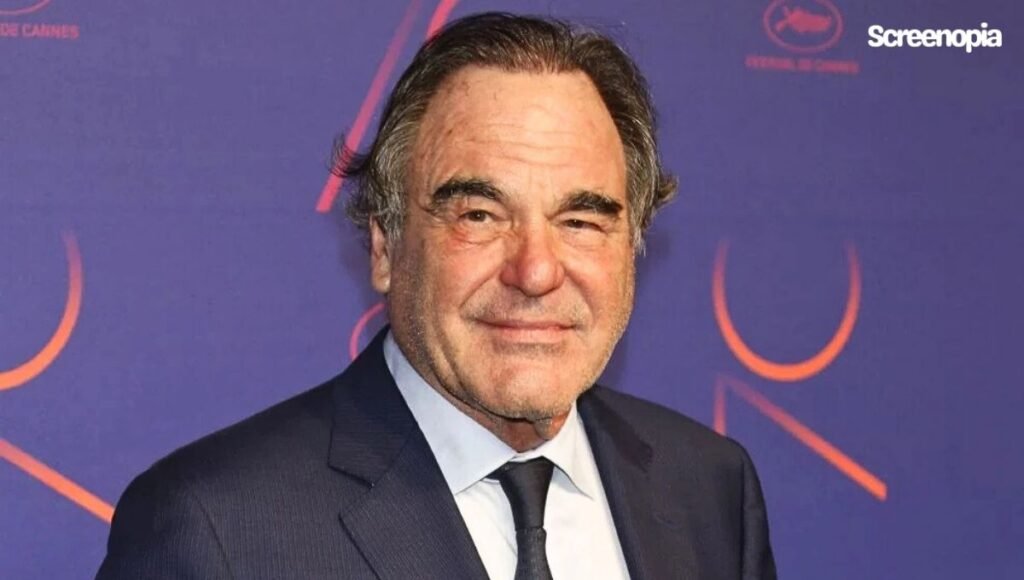Oliver Stone is one of Hollywood’s boldest and most controversial directors, a filmmaker who has never been afraid to confront politics, war, or the darker sides of the American dream.
Over the course of his career, Stone has won multiple Academy Awards, fueled endless debates, and left behind a catalog of films that continue to spark conversations decades after their release.
His work is raw, unflinching, and often polarizing, but it’s exactly this fearless approach that solidifies Oliver Stone as a filmmaker we can’t ignore.
Whether you know him from his Vietnam trilogy, his explosive political thrillers, or even his more experimental projects, there’s no denying his impact on modern cinema. Let’s break down seven defining moments that shaped Oliver Stone’s filmmaking legacy and why his work still matters today.
1. Writing Scarface (1983)
Before becoming a household name as a director, Oliver Stone made headlines in Hollywood as a screenwriter. One of his biggest breakthroughs was penning the script for Scarface. His gritty dialogue and unapologetic portrayal of Tony Montana’s rise and fall gave the film its edge. While Brian De Palma directed it, Stone’s script cemented his reputation as a writer who could cut straight to the raw nerve of American culture.
This was one of Stone’s first lessons in using cinema to explore obsession, excess, and moral decline, themes that would resurface throughout his career.
2. Platoon (1986) and the Vietnam Reckoning
Oliver Stone is a Vietnam veteran himself, and his personal experiences informed Platoon, the film that would skyrocket him into the Hollywood elite. Unlike earlier Vietnam movies, Platoon captured the chaos, fear, and disillusionment of combat with unflinching realism. Stone didn’t glorify war — he humanized it, showing young men caught in impossible circumstances.
The film won four Oscars, including Best Picture and Best Director for Stone, and marked the beginning of his reputation as a filmmaker unafraid to tell the uncomfortable truth.
3. Wall Street (1987) and the Rise of Gordon Gekko
Hot on the success of Platoon, Stone turned his eyes toward corporate America with Wall Street. The film introduced audiences to Gordon Gekko, played by Michael Douglas in an Oscar-winning performance. With the infamous phrase “greed is good,” Gekko became both a cautionary tale and an icon.
For Stone, Wall Street was another way to show the moral compromises behind power and wealth. It remains one of the most referenced movies when discussions of capitalism and corporate culture come up, proving its long-lasting relevance.
4. Born on the Fourth of July (1989)
Stone followed up Platoon with another Vietnam film, but this time from a different perspective. Born on the Fourth of July, starring Tom Cruise, tells the real-life story of Ron Kovic, a paralyzed war veteran who became an activist.
The movie showcased Stone’s ability to not just depict war but to explore its aftermath on ordinary people. Cruise’s performance earned him his first Oscar nomination, while Stone won the Best Director award again. This cemented him as one of the most daring storytellers of his generation.
5. JFK (1991) and the Power of Conspiracy
If there’s one film that truly demonstrates Oliver Stone’s ability to ignite controversy, it’s JFK. The movie re-examined the assassination of President John F. Kennedy and leaned heavily into conspiracy theories. While praised for its craftsmanship, JFK also sparked outrage for blurring the line between fact and speculation.
Regardless of where you stand on its accuracy, the cultural impact of JFK is undeniable. It pushed audiences to question official narratives and reignited public debates about truth, transparency, and government accountability.
6. Natural Born Killers (1994) and Media Critique
Few films caused as much outrage in the 1990s as Natural Born Killers. With Woody Harrelson and Juliette Lewis as killer lovers turned media sensations, Stone turned the camera on society’s fascination with violence.
The film’s psychedelic editing style, dark humor, and shocking violence divided audiences. But beneath its chaotic surface lay a cutting commentary: media exposure can turn even the worst criminals into cultural icons.
Today, in an age of viral clips and true-crime obsessions, Stone’s critique feels eerily prophetic.
Oliver Stone’s career is filled with bold projects beyond his most famous war and political dramas.
He captured the chaotic spirit of rock legend Jim Morrison in The Doors (1991), explored presidential scandal in Nixon (1995), and returned to modern whistleblower politics with Snowden (2016). Even his darker, offbeat thriller U Turn (1997) showed his willingness to experiment with genre and style. Together, these films highlight Stone’s range as a filmmaker who can move from music biopics to political exposés to twisted noirs, all while leaving his unmistakable stamp.
7. Documentaries and Global Politics
Oliver Stone hasn’t confined himself to narrative films. He has also ventured into documentaries, often tackling subjects that mainstream filmmakers avoid. From “South of the Border” (2009), which explored Latin American politics, to his intimate interviews with world leaders in “The Putin Interviews” (2017), Stone has consistently challenged dominant narratives about geopolitics.
This documentary work demonstrates that Stone’s curiosity extends beyond Hollywood storytelling. He seeks truth, even when that truth is controversial or unpopular, making him one of cinema’s most unpredictable voices.
Why Oliver Stone Still Matters
In a Hollywood landscape that often plays it safe, Oliver Stone remains a director who takes risks. His films are not designed to comfort audiences — they’re made to provoke, challenge, and sometimes unsettle. That’s why they endure.
From Platoon to JFK to his modern documentaries, Stone continues to ask difficult questions about power, truth, and morality. While not everyone agrees with his perspective, his work ensures that cinema stays a place for debate, not just entertainment.
And that may be Oliver Stone’s greatest legacy: reminding us that film can still be dangerous, and in being dangerous, it can be unforgettable.



